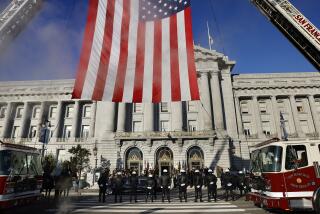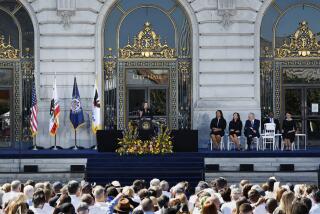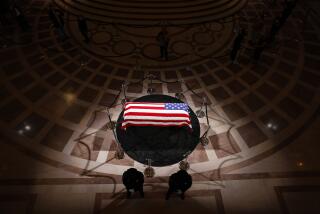In Washington, a World War II Icon Dazzles Dignitaries Once More : Anniversary: Lawmakers flock to honor Mme. Chiang Kai-shek, 98, at reception co-hosted by Bob Dole.
WASHINGTON — Even senators and representatives rarely come upon a living icon of World War II, so many of them jostled through a crowd Wednesday to shake the hand of a tiny, elegant guest with green jade earrings. The guest at the congressional reception: Mme. Chiang Kai-shek, 98 years old, returning to Capitol Hill, scene of one of her most spectacular triumphs.
In 1943, more than half a century ago, Mme. Chiang, the wife of the generalissimo who then ruled China, captivated the American public with speeches to the Senate and House, thanking Americans for joining the Chinese in the war against Japan. The lead of a newspaper story that day began, “The First Lady of China smiled, spoke and conquered.”
There were echoes of that triumph Wednesday as the widow, seated in a chair in the ornate, marbled Senate Caucus Room in the Russell Senate Office Building, read a short speech with a crisp, strong voice in the elegant English she perfected at Wellesley College many years ago.
“I’m happy that you remember an old friend from China who was a wartime ally,” she said, adding that she believed “the combined effort of our two countries laid the foundation for the final victory of World War II.”
Controversy enveloped Mme. Chiang, whose Chinese name is Soong May-ling, and her late husband in the years after the war’s end. The Chiangs failed to persuade the Americans to rescue them from defeat by the Chinese Communists after World War II but then succeeded in persuading American presidents to recognize the Nationalist island of Taiwan as the government of China for more than 20 years. President Richard Nixon finally recognized the Communist government of mainland China in 1972, three years before Generalissimo Chiang Kai-shek died.
In 1943, Mme. Chiang had been received in the White House, and First Lady Eleanor Roosevelt escorted her to lecterns in the Senate and House. But Clinton Administration officials stayed away from Wednesday’s reception, clearly out of fear of offending Beijing. Yet the ceremony had a nonpartisan air, with Sen. Paul Simon (D-Ill.) joining Senate Majority Leader Bob Dole (R-Kan.) as co-sponsor and presenting Mme. Chiang to guests.
Simon, whose parents were missionaries in China, said that he and Dole had invited Mme. Chiang to commemorate the 50th anniversary of the end of World War II on Aug. 14. He described her as “the only remaining major figure of that time.”
As senators and representatives and Chinese from Taiwan approached Mme. Chiang, she smiled. She chatted and laughed with those who pushed their way to her chair to greet her personally. Among those who came was Sen. Strom Thurmond (R-S.C.), the oldest member of Congress but five years her junior.
Dole introduced Tricia Nixon Cox, the late President’s daughter. Sen. Phil Gramm (R-Tex.), a rival of Dole’s for the next Republican presidential nomination, also made his way to Mme. Chiang.
The Caucus Room was decorated with large black-and-white photographs of Mme. Chiang, sometimes accompanied by her husband or conferring with such notables as President Franklin D. Roosevelt and his wife; Gen. Claire Chennault, commander of the Flying Tigers, American volunteers who flew with the Chinese air force, and Gens. Dwight D. Eisenhower and George C. Marshall. One photograph showed her addressing the House in 1943.
Among the guests was 77-year-old retired Air Force Capt. Myron Levy of St. Louis, who had chauffeured Mme. Chiang around a U.S. Air Force base in Hunan province in China during the war.
Mme. Chiang, who has lived in the New York area for a decade but has not made an appearance in Washington since she addressed the National Press Club in 1966, reminded the crowd of well-wishers that she told Congress in 1943 that “I will always look on America as my second home.”
More to Read
Sign up for Essential California
The most important California stories and recommendations in your inbox every morning.
You may occasionally receive promotional content from the Los Angeles Times.










